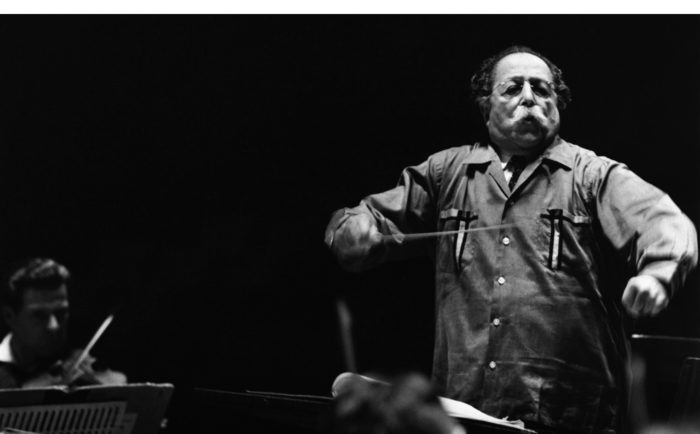
Monteux – III – Berlioz Symphonie Fantastique NYPO 1959
Pierre Monteux – New York Philharmonic (NYPO)
Berlioz Symphonie Fantastique
Carnegie Hall – February 28, 1959
Source Bande /Tape: 2 pistes 19cm/s / 2tracks 7.5 ips
Entre le 27 février et le 22 mars 1959, Dimitri Mitropoulos devait diriger comme chef invité quatre semaines de concerts avec le NYPO, avec des programmes consacrés en majorité à la musique française. Le 23 janvier, il a subi une deuxième attaque cardiaque qui l’a obligé à interrompre son activité pour de longs mois. Les programmes que Mitropoulos devait diriger étaient les suivants:
26, 27 & 28 Février; 1er Mars: ROUSSEL Symphonie n°3; SCHMITT La Tragédie de Salomé – BEETHOVEN Concerto n°5 avec Rudolf SERKIN
5, 6 & 7 Mars: BARRAUD extraits du Ballet ‘L’ Astrologue dans le Puits’; BERLIOZ Rêverie et Caprice avec Josef SZIGETI; EGK Geigenmusik avec Josef SZIGETI – SAINT-SAËNS Symphonie n°3
8 Mars: LALO Le Roi d’Ys Ouverture; SAINT-SAËNS Concerto n°2 William MASSELOS – CHAUSSON Symphonie
12, 13, 14 & 15 Mars: DEBUSSY Pelléas et Mélisande (version abrégée) avec Phyllis CURTIN (Mélisande), Nicolaï GEDDA (Pelléas), Martial SINGHER (Golaud), Regina RESNIK (Geneviève), Kenneth SMITH (Arkel)
19, 20, 21 & 22 Mars: BERLIOZ Le Corsaire, Ouverture – Cinq extraits de Roméo et Juliette – Carnaval Romain, Ouverture
Jean Morel a assuré les concerts DEBUSSY (Pelléas et Mélisande) et Paul Paray a dirigé lors de la quatrième semaine un programme différent tout en reprenant la Symphonie n°3 de Saint-Saëns.
Les deux premières semaines ont été confiées à Pierre Monteux (le contrat a été signé le 2 février), lequel a certes dirigé de la musique française, mais d’un répertoire plus limité (Berlioz et Ravel), c’est-à-dire une occasion de donner en concert deux compositeurs qu’il n’a pu que très peu diriger à Boston depuis son retour en 1951 comme chef invité du BSO. Les deux concerts enregistrés dont nous disposons sont ceux du samedi soir et non, comme c’était en général la cas, du dimanche après-midi.
Quoi qu’il en soit, il est très intéressant de disposer de cette très belle ‘Fantastique’ en public, car, une version avec le BSO n’ayant pas été possible, les deux derniers enregistrements de l’œuvre par Monteux sont pour l’un controversé (WPO 1958), alors que l’autre (NDR 1964) n’est pas du tout réussi. Si les deux versions antérieures avec le SFSO (1945 et 1950) sont magnifiques, la prise de son en est plutôt décevante. D’ailleurs, de tous ses enregistrements commerciaux, Monteux préférait le tout premier, de 1930, avec l’OSP (Orchestre Symphonique de Paris), de surcroît remarquablement bien enregistré pour l’époque.
Le programme est présenté par Stuart Metz qui remplace Jim Fassett, en déplacement à l’étranger.
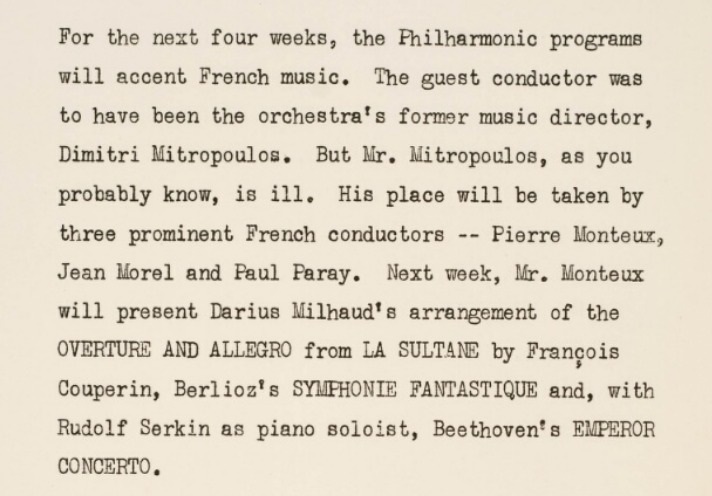
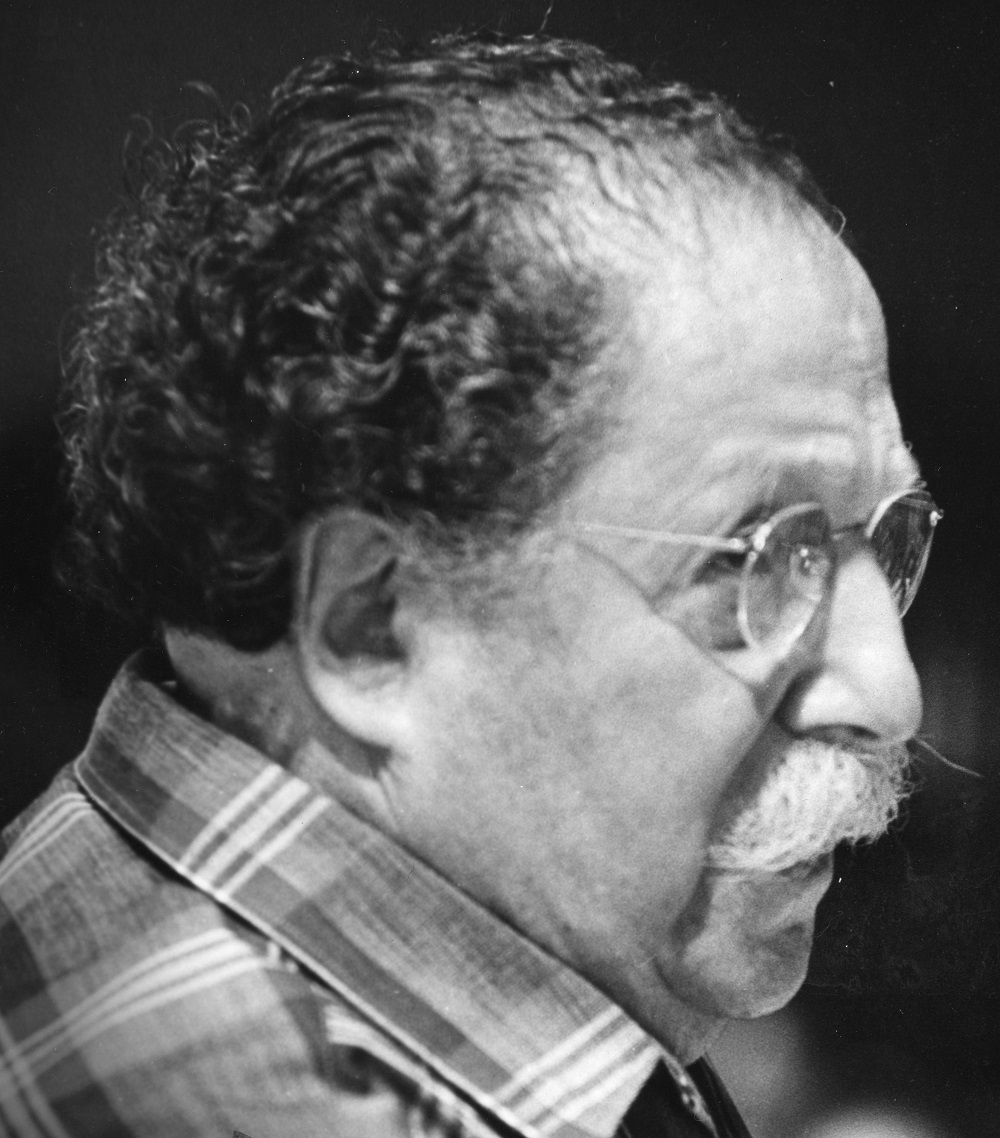
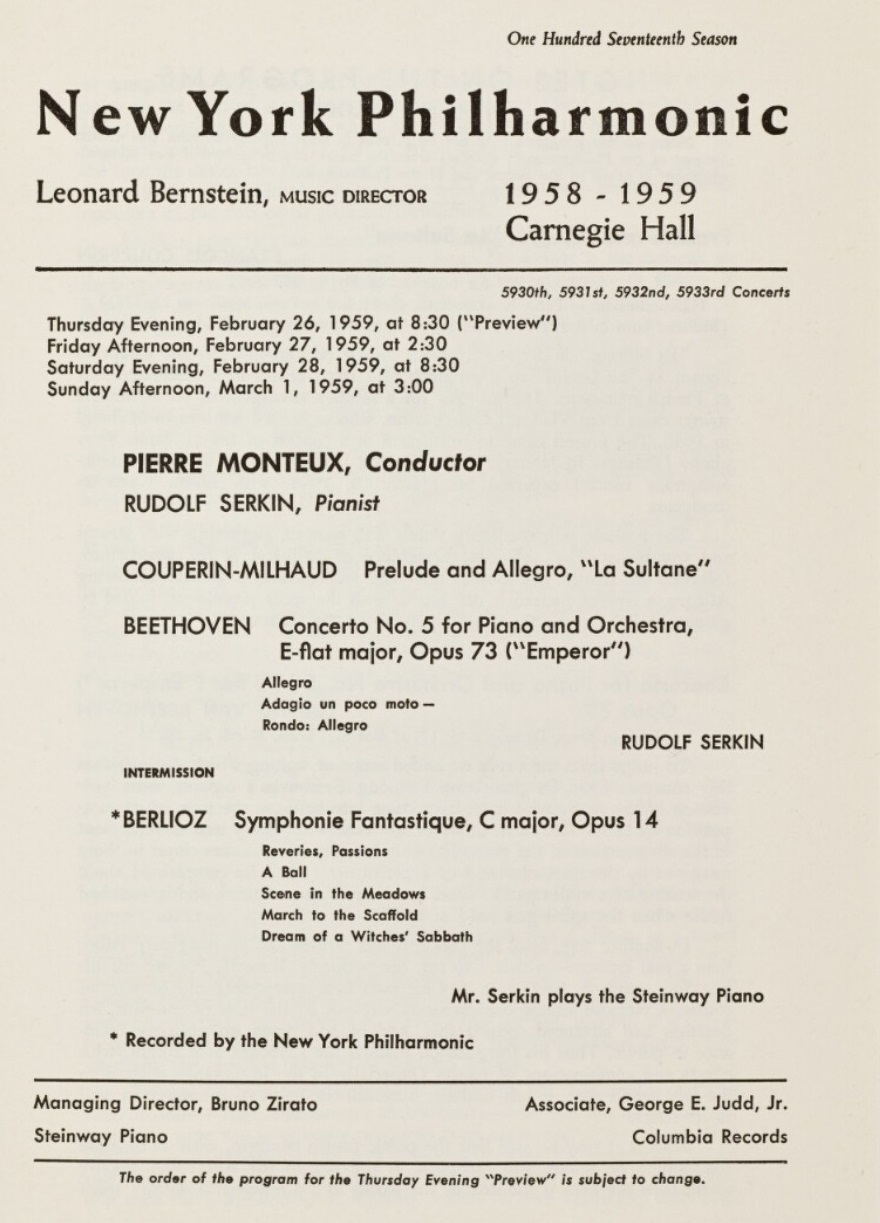
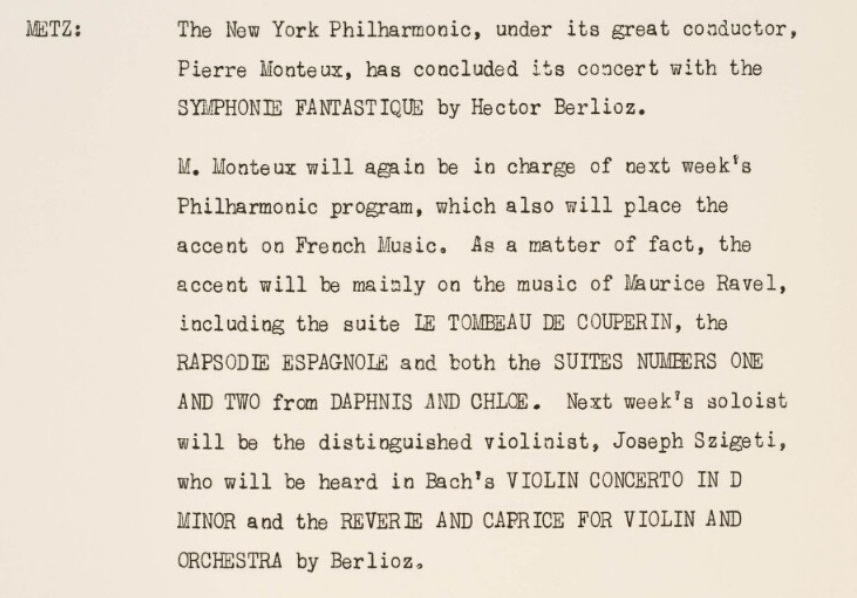
Between 27 February and 22 March 1959, Dimitri Mitropoulos was to conduct as guest conductor four weeks of concerts with the NYPO, with programmes devoted mainly to French music. On 23 January he suffered a second heart attack, forcing him to interrupt his activities for several months. The programmes Mitropoulos was due to conduct were as follows:
February 26, 27 & 28; March 1: ROUSSEL Symphony n°3; SCHMITT ‘La Tragédie de Salomé’ – BEETHOVEN Concerto n°5 with Rudolf SERKIN
March 5, 6 & 7: BARRAUD excerpts from the Ballet ‘L’ Astrologue dans le Puits’; BERLIOZ ‘Rêverie et Caprice’ with Josef SZIGETI; EGK Geigenmusik with Josef SZIGETI – SAINT-SAËNS Symphony n°3
March 8: LALO ‘Le Roi d’Ys’ Overture; SAINT-SAËNS Concerto n°2 William MASSELOS – CHAUSSON Symphony
March 12, 13, 14 & 15: DEBUSSY Pelléas et Mélisande (abridged version) with Phyllis CURTIN (Mélisande), Nicolaï GEDDA (Pelléas), Martial SINGHER (Golaud), Regina RESNIK (Geneviève), Kenneth SMITH (Arkel)
March 19, 20, 21 & 22: BERLIOZ ‘Le Corsaire’, Overture – Five excerpts from ‘Roméo et Juliette’ – ‘Carnaval Romain’, Overture
Jean Morel conducted the DEBUSSY concerts (‘Pelléas et Mélisande’), and Paul Paray conducted a different programme in the fourth week, taking up Saint-Saëns’ Symphony No. 3.
The first two weeks were entrusted to Pierre Monteux (the contract was signed on 2 February), who for sure conducted French music, but from a more limited repertoire (Berlioz and Ravel), namely an opportunity to perform two composers he could only marginally conduct in Boston since his return in 1951 as guest conductor of the BSO. The two recorded concerts we have are those on Saturday evening, and not, as usual, Sunday afternoon.
Be that as it may, it is very interesting to have this very fine ‘Fantastique’ performed live, since, a version with the BSO having been impossible, Monteux’s last two recordings of the work were for the first one (WPO 1958), controversial , while the other (NDR 1964) was not at all successful. While the two earlier versions with the SFSO (1945 and 1950) are magnificent, the recorded sound is rather disappointing. In fact, of all his commercial recordings, Monteux preferred the very first, from 1930, with the OSP (Orchestre Symphonique de Paris), which was also remarkably well recorded for its time.
The programme is presented by Stuart Metz, who replaces Jim Fassett, who was travelling abroad.
Les liens de téléchargement sont dans le premier commentaire. The download links are in the first comment


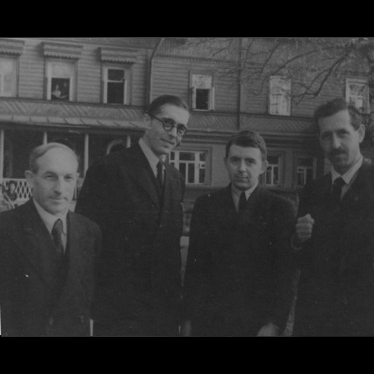
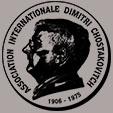
6 réponses sur « Monteux – III – Berlioz Symphonie Fantastique NYPO 1959 »
HD / Hi-Res (24 bits/88 KHz):
https://e.pcloud.link/publink/show?code=kZmOMDZ6U0ITU3qBokli7z5S39idQvvih07
Format CD / CD Quality (16 bits/44 KHz):
https://e.pcloud.link/publink/show?code=kZuOMDZtEOd1d8Ut3bC4LJYAB1Y7HNpWxEX
Thank you, a very vivid transfer. Do you have the rest of the concert, by chance?
Thanks. I have a tape of the Beethoven 5th Concerto with Serkin, but it is from another source (3.75 ips) that is not as good, and I haven’t dubbed it.
That is great to have this recording of Monteux, indeed great performance! But could You be please more specific what does it mean « a version with the BSO having been impossible » – impossible? Also if You could shed light on why the WPO 1958 recording is controversial…
An article published in High Fidelity (February 1961) is helpful to understand the dilemma. It describes the Monteux reading with the WPO as ‘relatively placid’, but also as being a startling revelation that the work might be a logical extension of the classical tradition: ‘Not for extroverts, certainly, Monteux’s Fantastique is a work of pure poetry for listeners who are willing to let its magic grow on them’.
Of course, many listeners (or critics) were not willing to share this view, and this version was either praised as in this article, or dismissed as lacking the typical Berlioz touch. In this sense, it can be said that this recording is controversal.
On the other hand, Munch was the music director of the BSO, and he identified himself with Berlioz. Monteux, as guest conductor had to comply: he could not play Berlioz with the BSO other than marginally, nor make any Berlioz recording. It was the same for Ravel, but not for Debussy (he recorded La Mer and Nocturnes with the BSO).
In 1962, Monteux conducted the Symphonie Fantastique with the ‘Concertgebouworkest’ on May 24 in Amsterdam, on May 29 in Eindhoven, and on June 4 in Vienna (Musikvereinsaal).
In her book ‘It’s All in the Music – The Life and Work of Pierre Monteux’, Doris Monteux wrote (page 71) about the 1958 recording of the Symphonie Fantastique with the WPO:
‘‘The month of June (1962) was truly hectic, as we spent the first week of it with the Concertgebouw Orchestra at the Vienna Festival, where the Maestro had a colossal success with the Symphonie Fantastique of Hector Berlioz. I was elated, as he had previously made the recording of the immense work with the Vienna Philharmonic Orchestra, a complete fiasco in every way, inasmuch as this famous orchestra did not have the necessary temperament for this work of intense hallucination and passionate imagery. We have listened but once to this mediocre recording, which we feel inferior to that made by the Orchestre Symphonique de Paris years ago, and especially to the recording of the same work by the San Francisco Symphony Orchestra. I feel that evening in the Musikverein Hall a sort of reparation for poor Berlioz, as well as an immense satisfaction for the Maestro, as the magnificent Dutch orchestra folllowed him and shared to the nth degree his feeling for this poignantly dolorous and exciting music’.